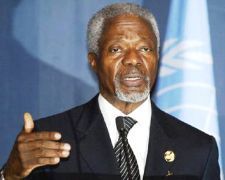UN’s Annan calls for more African Union troops in Sudan’s Darfur
By LEYLA LINTON
UNITED NATIONS, May 7, 2005 (AP) — The African Union peacekeeping mission in Darfur needs to be strengthened but help from U.N. soldiers will be limited, U.N. Secretary-General Kofi Annan said in a report Friday.
 Annan said although violence in Darfur was not occurring on the massive scale of last year, the general level of insecurity in Darfur was still hindering humanitarian aid and remained “unacceptable.”
Annan said although violence in Darfur was not occurring on the massive scale of last year, the general level of insecurity in Darfur was still hindering humanitarian aid and remained “unacceptable.”
He said attacks have continued, highlighting the destruction last month of the South Darfur village of Khor Abeche by armed militia from the Miseriyya tribe of Niteaga under the command of Nasir Al Tijani Adel Kaadir.
Annan also said that if those displaced by the conflict were to return it is widely believed they would face renewed attacks. They were already at risk of murder, rape or other crimes if they ventured outside the camps set up to shelter them, Annan said.
The AU mission needs to expand from its current level of around 2,000 to 7,447 soldiers and police by the end of August to improve security, Annan said.
He said large numbers of people displaced by the conflict were not expected to return to their homes between June and August because of the threat of violence and the lack of food.
Annan said the U.N. peacekeeping mission to Sudan would only be able to offer limited help to the AU troops in the coming months because it needed to focus all its attention on monitoring a north-south peace deal struck earlier this year between the government and southern rebels that ended a 21-year civil war.
The United Nations and its mission in Sudan could, however, help the African Union mission with technical advice, training support, help in choosing police, by developing an expansion plan and by convening troop contributors and pledging conferences.
An even larger deployment of 12,000 troops would be needed to keep the peace throughout Darfur to enable the return of all displaced people by the 2006 planting season, according to Annan.
He stressed that although it would be up to the African Union to decide how to organize this, its leaders might decide it was time for the wider international community to play a part in this complex operation which would require “a substantial increase in resources,” he said.
The vast western Sudanese region of Darfur is the scene of one of the world’s worst humanitarian crises. An estimated 180,000 people have died in the upheaval — many from hunger and disease — and about 2 million others have been displaced since the conflict began in February 2003.
It erupted when rebels took up arms against what they saw as years of state neglect and discrimination against Sudanese of African origin. The government is accused of responding with a counterinsurgency campaign in which the Arab Janjaweed militia committed wide-scale abuses against the African population.
A U.N. commission concluded in January that crimes against humanity — but not genocide — occurred in Darfur and recommended that cases of alleged atrocities since July 1, 2002 be referred to the International Criminal Court.
